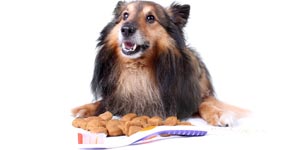
Did you know that dogs have dental problems, too? Domesticated dogs eat processed food and end up with many of the same dental problems as humans. In fact, 85% of all pets have some form of dental disease by the time they are three years old. Don’t let your pet be a statistic! Follow these steps to ensure healthy teeth for your dog!
- Get your dog’s teeth professionally cleaned. This is an excellent place to start, especially for dog owners who have not been following a canine dental routine. Your veterinarian can help you determine how often your dog needs his teeth cleaned, but it should always be done by a veterinarian. Many dogs require anesthesia for a dental cleaning, and a veterinarian can make sure your dog is safe as well as give you information about which procedures need to be done: cleaning, tooth pulling, etc.
- Only get your dog’s teeth cleaned at the vet’s office! Some groomers offer nonanesthetic dental cleaning for dogs. However, they generally do not have the tools or the experience needed to adequately clean your dog’s teeth. Your dog’s gums can be injured if an inexperienced person tries to use scaling instruments. In addition, oral health is so intertwined with your dog’s general health that a physical should be performed before your dog gets his teeth cleaned. Don’t skimp on care for your dog!
- Brush your dog’s teeth at home. Although this is best begun when your dog is a puppy, you can also start the routine after a dental cleaning at the vet. Use a special dog toothbrush and toothpaste, and ask your veterinarian to demonstrate how to brush your dog’s teeth if you are unsure. Never use human toothpaste, as some of the ingredients could be harmful for your dog. Besides, your dog probably wants the beef or liver flavored toothpaste!
- Make sure all toys and chews are safe. Dogs like to chew on everything. Be sure that your dog’s toys and chews are safe for her to chew on. Products that have the Veterinary Oral Health Council (VOHC) seal have been proven to be safe for dogs. Products that are unsafe can damage your dog’s teeth and gums.
- Ask your vet about the Porphyromonas vaccine. Relatively new, this vaccine provides immunization against the bacterium Porphyromonas, which is one of the causes of periodontitis. Periodontitis is a disease that causes bone loss in the jaw, leaving teeth loose. Although this vaccine may not be the best for every dog, your veterinarian can provide information.
- Ask your vet about a preventative oral gel. A new gel has been manufactured that may help stop bacteria from sticking to your dog’s tooth enamel.
- Use dental treats and good food for your dog. Specially formulated dry dog food is available from your vet’s office, and your vet can also recommend which treats are best for cleaning the teeth and stimulating the gums.
Remember, your dog’s teeth need care just like yours do. Poor oral hygiene not only affects your dog’s teeth and gums, but allows bacteria to enter the bloodstream and damage your dog’s liver, heart, and other internal organs. Make sure you are as loyal to your best friend as he is to you!
